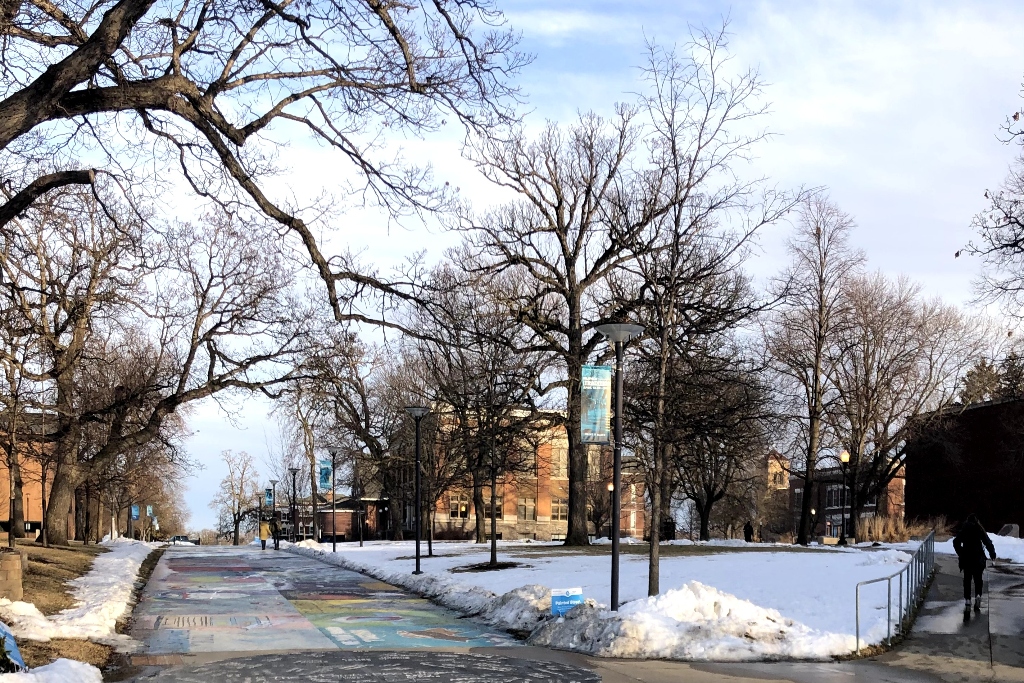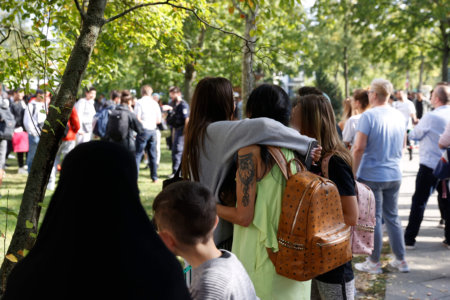
It was a bland McDonald’s Spicy Crispy Chicken Sandwich that made me realise I missed home.
It happened on the clearest of winter days after the most ordinary of school runs on an unextraordinary night. I was sat on the living room floor, dazed against an episode of “Golden Girls.”
The sandwich looked too limp in the box to be the hearty McD burgers we had back home, but it reminded me of something else too — 2 a.m. runs to 24-hour joints with my best friends. Clear roads, mindless chatter, satiated tummies.
At this point, the colourful lights and knick-knacks in the room became nauseating to look at.
My bedroom back home threatened to split in half thanks to a crack that circled the entire room, wide enough to take a peek outside. I missed even that.
But I longed for my mom the most. I hated that she could only be a phone call away.
It felt cold, even with the heater put on blast in the dead of January winter. It felt lonely, even if I’d made good camaraderie with my peers. It felt unruly, trying to make a home out of Des Moines.
For the first time in a month since I’d moved from Malaysia, I felt homesick.

This was my reality the day after I arrived in Iowa from a hot tropical country for the first time. Source: Sarah Jamil
Homesickness dates back to 1688. A medical student in Switzerland named Johannes Hofer termed the phenomenon “nostalgia” in his dissertation, born out of the people dying from the “psychological burden” of living far away from home.
It was more of a disease than it was emotional distress, and the cases were mad.
Hofer wrote about a girl living away from home who fell from a great height and refused food and medicine. She returned home on the brink of death but recovered to proper health just a few days later.
According to The Scientist, soldiers from that time who were pained by nostalgia were buried alive and treated by “pain and terror.” In a period of poor mental health knowledge, they were taunted.
Today’s generation of homesickness isn’t as grim.
It’s no longer a guaranteed precursor to death, whether mild or extreme. Unlike the migrant students, soldiers, and workers of 1688, I knew exactly what it was.
When I moved away from home in the Southeast Asian country of Malaysia to the pinnacle of Midwestern America to attend Drake University, I knew it could affect me to a certain degree.
I just didn’t know how much.

My time abroad contributed heavily to my growth and independence as an individual. Source: Sarah Jamil
It’s okay not to be okay
“If you notice that you’re feeling homesick, don’t try to ignore how you’re feeling,” Mental Health America writes. “Acknowledge that you’re experiencing homesickness and allow yourself to feel sad for a while, such as by crying or just being quiet and noticing how you feel.”
That was my first mistake: not coming to terms with the fact that I was homesick.
I don’t know why I was so averse to admitting it. Perhaps I was arrogant, thinking, “I’m here in America on my own, and it’s better than everything I’ve ever known.”
I always told people I missed my family, but not Malaysia itself. Meanwhile, I craved the spice of our ethnic foods by day and the warm weather by night.
Perhaps I tried to steer away from home as much as possible because I felt left behind. Many changes occurred in my family in the two and a half years that I was too broke to buy a plane ticket back.
Their lives were filled with trials and tribulations. I felt helpless being unable to support them.
So, I trudged on, built a life in Des Moines, and enjoyed my freedom.
The thing is, time moves quickly when you’re trying to find your footing on unfamiliar ground. The newness of the people, the culture, and the food distracts you enough — until it’s not enough anymore.
The fateful night with the sorry excuse of a burger became the first of many raging downpours. Homesickness would hit me like a truck speeding downhill with no brakes.
I could not sleep, I lost my appetite, and I missed my deadlines. I finally had to pull my hood down, take a breather in the sun, and talk to someone.
5 ways to combat homesickness, according to me

On the worst of homesick days, turning to home-cooked meals and food brands that are familiar to me was a simple yet dopamine-inducing remedy. Source: Sarah Jamil
Keep in constant touch with your loved ones
I discovered there was truth behind the phrase “out of sight, out of mind” throughout my time in the US because it’s easy to forget the culture and people integral to your identity when you don’t see them.
I wasn’t the only one either. I’d be rich if I asked for a nickel each time a peer would jolt in realisation and say, “I haven’t called my mom in over a week!”
Talking to a loved one reminds you that you’re not alone. The first time I ever admitted I was homesick to a family member was smack bang in the middle of a raging party, on the phone with my sister.
And guess what — being open did wonders for my mood in the days to follow.
Talk to a counsellor or therapist
If you have access to a therapist or university counselling, here’s your sign to book an appointment.
Talking to a mental health professional allows you to sift through these complex emotions. These individuals are trained to help you navigate tough times through effective, actionable steps.
So take advantage of your university resources and exhaust their offerings.
My counsellor at university was a calm woman who validated my feelings and ensured my problems were heard. She taught me breathing and journaling techniques to alleviate my anxiety and frequently checked in with me.

The international students at Drake University are some of my closest friends. Source: Sarah Jamil
Find a community of like-minded people
Finding friends who understand what you’re going through is a rare and valuable gift.
You can start by joining extracurricular clubs at the university that pertain to your interests. In my first semester, I decided to join the broadcasting group as a producer and had the best Drake Relays Week my sophomore self could’ve ever imagined.
More importantly, engage with the international student community!
There’s bound to be at least a few, if not plenty, of students like you. No one will understand the pains of homesickness like those who’ve been through it before.
Communicate with your advisor
The faculty members in your school have your best interest at heart. They should know better than anyone that students aren’t invincible.
There will always be good, bad, and ugly days. The best thing you can do is communicate with your advisor about your feelings, and how it’s affected your progress.
The worst that could happen is they offer a meek “okay.”
The best thing that could happen is that they actively work with you to devise a study plan that’s feasible to get through for your state of mind. You’ve gained another shoulder to lean on, which lifts some of the pressure to constantly perform off your back.
Build or reform your daily routine
The act of restructuring my daily routine after wallowing in homesickness and self-pity came a bit later. You don’t have to rush through recovery. You’re only human. You owe it to yourself to be patient.
I have less commitment to a daily routine than I do to television shows that are more than a season long. But having a few simple daily habits to commit to, I’ve found, helps build momentum for success.
For example, I always waited at least 20 minutes before jumping on my phone after waking up, and I ended the day with my head buried in a book instead of social media. My Sundays were dedicated to laundry and a pop to the Asian grocery store for a restock of ingredients reminiscent of home.
Simple but highly effective.

When I visited New York City for the first time, I remember feeling like I’d be content staying there forever. Source: Sarah Jamil
If you don’t feel homesick
It’s perfectly fine to not feel homesick.
People have different relationships to the concept of family and home. Society can’t tell you what’s right and wrong when it comes to your feelings, especially if they have no clue who you even are.
“It boggles my mind that many people genuinely miss their families and want to talk to them and spend time together,” a Reddit user writes. “I had a moment of clarity when I realised that I’ve never had any photos of my family anywhere in my life – not displayed on shelves, not on social media, not on any devices.”
Another user added, “I cannot even imagine how it must feel. It must be a blessing to be so close with your family to the point where you feel sick without them.”
I’m not going to sit here and say, “Homesickness is a privilege!” In the ugliest of days, when loneliness seeps into your bones, it feels like hell — and that’s in the context of studying abroad, likely by choice.
I do think that if you are missing home, however, you ought to take a step back and appreciate the people who’ve raised you into the person you are today.
And maybe give them a call.










